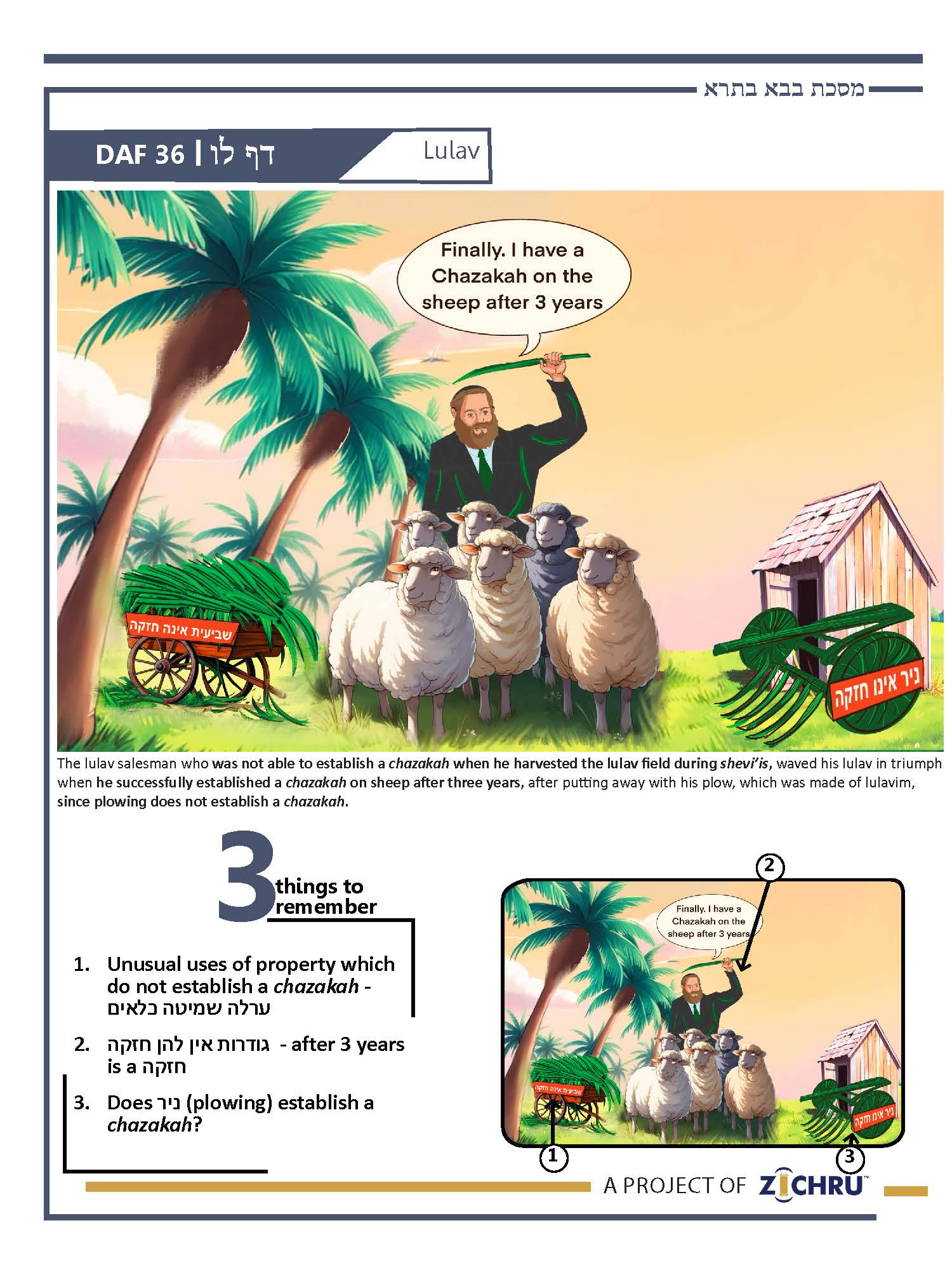Bava Basra - Daf 36
- Audio Timestamps
0:00 - The 3 Sugyos
2:43 - Review of 3 Sugyos
5:12- Siman
8:03 - 4 Blatt Back Chazarah
15:06 - Pop Quiz (Last 7 blatt)
For access to all Zichru resources including PDFs, and illustrations CLICK HERE
- Unusual uses of property which do not establish a chazakah
A Baraisa teaches that if an occupant consumed a field’s produce which was ערלה, shemittah, or כלאים, he does not establish a chazakah. Since ערלה and כלאים produce are both forbidden in benefit, and shemittah produce is hefker for anyone to take, the owner feels no need to protest the occupant’s harvesting it. Rav Yosef said: אכלה שחת לא הוי חזקה – if he consumed [the produce] as unripe grain to feed to his animals before it could ripen for humans, it is not a chazakah, because this usage is typical of a thief, not an owner. In the valley of Mechuza, where the farmers normally harvested this way, it would constitute a chazakah. Rav Nachman says using broken land does not establish a chazakah, because the owner does not bother protesting if its minimal produce is stolen. אפיק כורא ועייל כורא– If he used a kor of seed to plant and harvested only a kor of produce, it does not establish a chazakah, since it did not generate any profit. Family members of the Reish Gelusa cannot establish a chazakah against others, since people are afraid to protest against them, and others cannot establish a chazakah against them, since they are confident that they can retake their property whenever they want.
- גודרות אין להן חזקה
The Mishnah taught that one can establish a chazakah in slaves by using them for three years. The Gemara asks that Reish Lakish said: הגודרות אין להן חזקה – animals do not have chazakah to prove ownership!? Since they can move about on their own, possessing them does not prove ownership. Rava answers that although they do not have immediate chazakah (like ordinary מטלטלין), they do have a chazakah after three years, because the owner should have protested before then. Rava said that if the slave was a קטן מוטל בעריסה – infant lying in a cradle, his chazakah is immediate, like any מטלטלין. We are not concerned that his mother brought him to this domain and left him there, because אימא לא מנשיא ברא – a mother does not forget her son. The Gemara records an incident where goats ate barley in Nehardea, and the barley owner seized the goats and claimed significant damages. Shmuel’s father ruled he was believed up to the goats’ value, since he could have claimed he had purchased them. Although animals normally cannot be claimed by their possessor, goats are handed to a shepherd, and do not wander on their own.
- Does ניר (plowing) establish a chazakah?
In a Baraisa it was taught: ניר אינו חזקה – plowing does not establish a chazakah, but some say it does. This second opinion is Rebbe Acha’s, because a Baraisa says that if one plowed a field for one year and planted it for two, or the reverse, the Tanna Kamma says it does not establish a chazakah, and Rebbe Acha says it does. The reason plowing would establish a chazakah is: לא עביד איניש דכריבו ליה לארעיה ושתיק – a man would now allow that [another] will plow his land and he remain silent. The other opinion holds that the owner reasons: כל שיבא ושיבא דכרבו לעייל ביה – “Let him put every chip of the plow into [the ground]!” since he field will be plowed when he retakes it. Rav Nachman bar Rav Chisda told the people of Pum Nahara that Rebbe Acha and all the גדולי הדור held that plowing establishes a chazakah, but Rav Nachman bar Yitzchak said: רבותא למיחשב גברי – Is it a great thing to mention names? But Rav and Shmuel in Bavel, and Rebbe Yishmael and Rebbe Akiva in Eretz Yisroel, all hold plowing does not establish a chazakah!
Siman – Lulav
The lulav salesman who was not able to establish a chazakah when he harvested the lulav field during shevi’is, waved his lulav in triumph when he successfully established a chazakah on sheep after three years, after putting away with his plow, which was made of lulavim, since plowing does not establish a chazakah.


